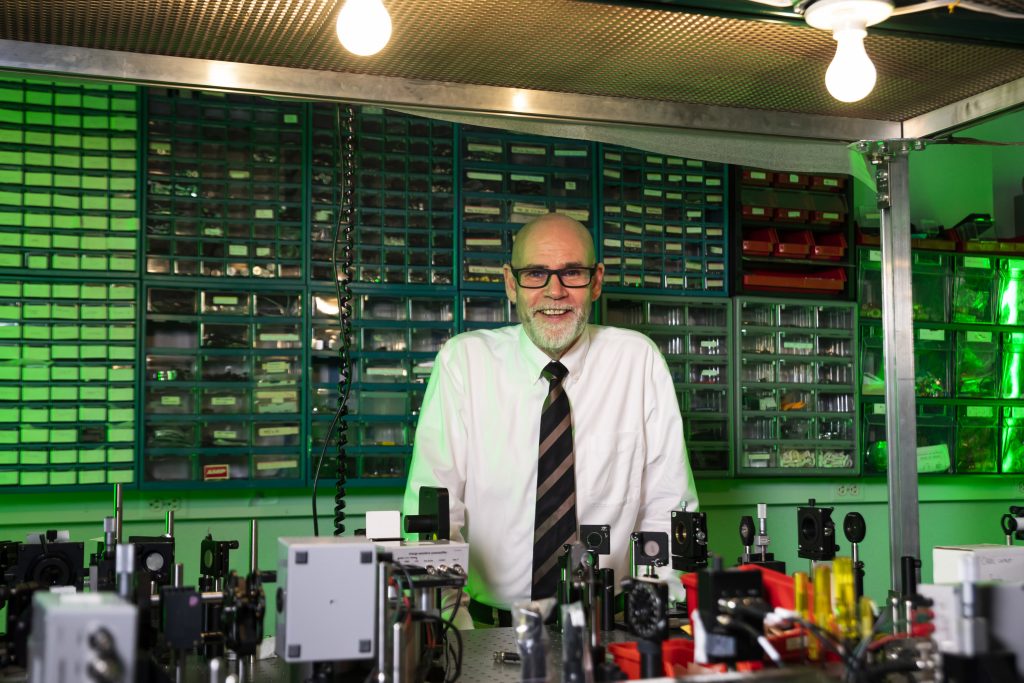
Pegasus Professor David Hagan, Ph.D. recently assumed responsibility as the third dean of CREOL, the College of Optics and Photonics. Hagan has a ground floor perspective on the college as one of the original faculty to join CREOL shortly after its founding in 1986. In this interview, Hagan shares the beginning of his career and his vision for the college.
CREOL: Where did your interest in optics and photonics begin?
High school teachers cultivated my interest in physics, but it was my time at Heriot-Watt University in Edinburgh, Scotland, that really got me interested in optics. They happened to have a strong laser program, which actually didn’t interest me at first, but the more I learned about lasers, the more excited I became about the field. Then working on my senior project really set on me on that path.
CREOL: Was there a moment that solidified or confirmed this was the path you wanted to take your career?
My senior project was to build a device based on optical thin films that could control the output power of a laser. There was a lot of design and learning involved, but I also enjoyed interacting with the end users, learning what their needs were, and incorporating that into the design.
CREOL: What are some highlights from you career?
Completing my dissertation at Heriot-Watt University, and then working as a post-doc at the University of North Texas were certainly highlights. I always thought I would end up in industry, but I had the opportunity to come to UCF and build a research program, right as CREOL was being formed. That was something I just couldn’t miss.
There are a few times when our research results translated into a new understanding of our field. But I emphasize that these are team efforts involving faculty, colleagues, students. Much of the time in research you’re trying to find a result or verify a theory. It can be frustrating when your experiments don’t produce the results you were expecting, but I’ve discovered that’s actually when you find something new.
I’m also proud of my work building the undergraduate program at CREOL. We started as a graduate program and remained that way for many years. But I knew an undergraduate program would benefit so many students, so I worked as associate dean to set that up.
CREOL: Who inspires you?
There are almost too many people to name. My mother was an inspiration in many ways, especially for her work ethic. My high school physics teachers inspired me to learn physics, not just as a subject but as something to enjoy and even love. I’m very grateful for them and to many colleagues whom I’ve worked with shared great success. But if I had to name one person, it would be Eric Van Stryland, Ph.D., the founding dean of CREOL. He has tremendous insight and is an incredibly hard, energetic worker who never gives up on things. He finds ways to see projects to their end, even when most others would have given up.
CREOL: What brings you joy?
My kids and my family are at the top of the list. I enjoy watching colleagues and students as they become successful and go on to great careers. One of the UCF events I enjoy most are commencements. Commencement is one of the biggest days in a person’s life, and it makes me happy watching students and their families as they cross that finish line.
CREOL: Any hobbies?
When I was in college, I ran cross country, and I still enjoying running. I also used to enjoy wind surfing and sailing but rarely find the time these days. I do like to snow-ski when I get the chance. I also enjoy international travel and meeting new people, which is good because my job requires a lot of it. Best of all is when I am able to travel with my family.
CREOL: Moving into your role as dean, what makes CREOL, the College of Optics and Photonics, unique among its peers?
One of our greatest strengths is our industry partnerships. We were founded on the vision of expanding Florida’s reputation for optics excellence, and I can confidently say we continue to build on that goal every day.
I would add that CREOL carries a reputation for innovation. That’s a word that’s easy to toss around, but I mean that in the truest sense of the word. We’ve developed some groundbreaking ideas in optics and photonics here at UCF, and our alumni are making incredible advancements in this field.
CREOL: What is your vision for the college?
We want to be the world’s leader in education, research, and partnership in optics, lasers, and photonics.
CREOL: What kind of changes are coming to CREOL under your tenure, and what do you expect will remain the same?
We have several months of strategic planning ahead of us to determine the specific directions we wish to move in. But I want to emphasize and build on our work as research teams and not just individuals. We have many outstanding individuals on our faculty, but working in teams creates possibilities for running large, nationally recognized research programs. I will develop plans to increase the diversity of our faculty and student populations, and wish to ensure that CREOL is a welcoming place for individuals of every background, identity and affiliation.
I certainly aim to build our online master’s program. We have an outstanding program, but until recently this has only been available to those physically located in Central Florida. But photonics education is needed across the state and the nation, so it makes sense to offer our master’s degree online.
One thing that won’t change is our commitment to being a world leader in optics and photonics. As we have always done in CREOL, we will continue to hire faculty who are outstanding educators and researchers.